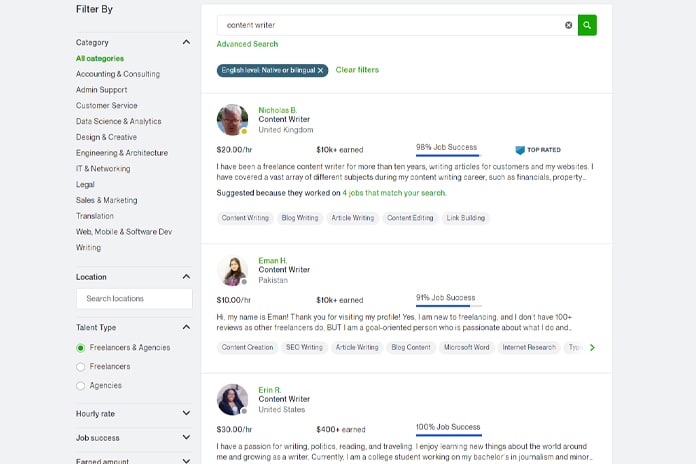Running a blog is hard work. It's no wonder that thousands of companies outsource their content writing every single day. Freelancers with content creation skills are in high demand, and some of the best charge rates that would make your head spin, and are worth it.
Outsourcing anything can be a challenge. Any business process you outsource makes you reliant on a third party to be successful and effective in their duties. Identifying good service providers, reviewing services, and training them; it's all going to take time and may have some false starts.
Something like content writing? It's just as hard but has an added layer of difficulty.
 The person or company you hire to outsource your content writing needs to be an expert in your subject, and they need to properly convey your brand to your audience. You're already a specialist in your industry; how can you ensure that you're hiring people with equal expertise?
The person or company you hire to outsource your content writing needs to be an expert in your subject, and they need to properly convey your brand to your audience. You're already a specialist in your industry; how can you ensure that you're hiring people with equal expertise?The truth is, outsourcing content writing is tricky, but not actually as hard as it sounds. You just need to know how to go about it properly.
Luckily, since it's such a common problem for so many businesses, there's plenty of information available on how to do it. We've compiled that information here for you, so you should be able to use this guide to get up and running quickly and easily.
The first thing you need to do is set goals. You know you need to do content marketing for the nebulous reason of "to help your business grow," but what does that mean? Different goals necessitate different kinds of content marketing, different kinds of calls to action, and so on.

Goals might include:
Of course, the reality is that you'll want all of these at some point. Content marketing can do all of it, but you need to be explicit in your goals so you can measure them, focus your efforts on them, and measure the effects those efforts have.
 Remember, different goals mean different kinds of content. A robust landing page can be an excellent piece of content for generating leads but won't do much to build your thought leadership or drive organic traffic.
Remember, different goals mean different kinds of content. A robust landing page can be an excellent piece of content for generating leads but won't do much to build your thought leadership or drive organic traffic.A regularly-updated blog with informational and tutorial content can build a great reputation but won't do much to convert users into customers.
Once you have your goals, you need to determine your target audience. Defining your audience in terms of general personas and archetypes allows you to target different kinds of content at different kinds of users. One single topic can be taken in multiple different directions depending on the target audience, after all.

A good audience persona is named and characterized, like a character sheet or profile from a game. It should include:
You'll also want to define whether your content is B2B or B2C. Your personas work the same way, but for B2B, you often add a layer of company persona on top; you're still targeting the individual decision-makers, but you have information about the companies they represent as well.
Here's a great guide on building these personas.
Critical decisions are the foundation of what you're going to be paying for.

There are a few that will guide your searching for content creators.
All of these decisions require some introspection and decision-making. You also might make certain decisions and decide later on that they aren't working out and want to change the parameters. As long as you haven't signed a lengthy contract, you're always free to do so, of course.
One of the most important decisions you'll make is whether to go with a freelancer or an agency. They each have their pros and cons, and neither is the "best" option. You need to decide which works best for your goals and intended workflow.
Agencies are more reliable and will have stronger contracts, more redundancy, and often more services available. They generally do more than just writing – they can handle images, social media, eBook creation, promotion, and more. They'll have multiple layers of overview and editing to ensure you get the best quality content you can.
On the other hand, agencies are generally pricey compared to freelancers. They also have more turnaround time and red tape to go through to hire them, may have required minimum contracts, and have their own processes; they're less flexible and adaptable to your needs. They also may not truly be experts or may even be silently reselling content from other sources.

Freelancers are cheaper and often faster, with shorter turnaround times. They tend to be quite responsive but can be fickle or flaky, particularly with unproven clients who may be more trouble than they're worth. However, they can also often adapt to your needs and, through gradual pressure over time, be molded into a perfect writer for your needs.
On the other hand, freelancers are often specialists in writing and may not want to do other things like social media, promotion, image creation, or other forms of media. Good freelancers can also sometimes be hard to find because there are a lot of people out there who claim to be writers but aren't really that good at it.
Whether you go with a freelancer or an agency, the rest of the process is fairly similar.
The decision to hire a freelancer or an agency is yours, and at this point, you need to start looking for one. You can find them all over the place – they have their own websites, or hang out on job boards, or on LinkedIn, and so on – but it's up to you to determine if they're the one you want to work with.
First, consider communication. How well does your freelancer or agency communicate? Do you have a dedicated account manager for an agency? Is the writer responsive? Do they ask the right kind of questions to determine whether or not they want to work with you? Are they experts in your industry?
Of course, content creators want your business, so they may say anything they can to get it. The proof, as they say, is in the pudding.

Thus, one of the best things you can do is ask for a trial run. Offer to pay for a test post or two to get a feel for the process, communication levels, and workflow. Different people and agencies will have different processes – no two content creators are alike – and a lot of your decision will come down to compatibility.
What do we mean?
Well, with an agency, you might typically operate outside of business hours, so if they shut down after 5 pm and are hard to contact, they might not be good to work with. Or, a freelancer might prefer using a text chat to communicate, while you prefer a video call. Or, you might have different ideas of how independent the content creators should be.
Check out resources like our interview tips for hiring writers for advice. If you have specific questions we haven't yet covered, feel free to ask in the comments, and we'll do our best to help you out.
There will always be some adaptation when you start working with someone to outsource a process. Your vision of how things work might not account for certain elements of the process, like revisions, images, meta data, and publishing. That said, you may not need to fully adopt the process that your freelancer or agency typically uses. Sometimes they may be flexible. Freelancers are often more flexible than agencies, as well.
A good process likely includes developing a content brief, target keywords, and topic ideas. You may go back and forth with the writer to refine a subject or answer questions, or you may not. A draft submitted may need revisions. How much you handle versus how much your freelancer or agency handles depends on your process, and can evolve over time.
It may take a few weeks or a few months of working together to iron out how the full process will work. Be aware that there may be some growing pains, and don't discount a service provider because of a few relatively minor issues.

That said, you do need to set lines in the sand to make sure you're getting what you want to get out of the deal. If the content is sub-par, you don't need to accept it for fear of looking bad or "breaking a promise" to a freelancer. Not every relationship works out, and both sides know it. It happens.
Deal-breakers may include things like:
Anything that constitutes a bad enough breach or a large enough red flag is grounds for seeking another source for your content. There's nothing wrong with shopping around!
 Note: don't be afraid to work with multiple freelancers. As mentioned, freelancers are often specialists. You can hire a freelancer for your general blog posts, a different one for landing pages and high-value sales copy, another for social media posts, and so on. The only downside is the increased administrative burden of managing it all on your end, and you can always hire someone to do that too.
Note: don't be afraid to work with multiple freelancers. As mentioned, freelancers are often specialists. You can hire a freelancer for your general blog posts, a different one for landing pages and high-value sales copy, another for social media posts, and so on. The only downside is the increased administrative burden of managing it all on your end, and you can always hire someone to do that too.As you build your relationship with your chosen freelancer or agency, and as you run your content marketing, you'll want to think back to those initial goals you defined. Watch the content you publish, and see how well it performs in reaching those goals. From there, you can determine whether you will need to make changes to the process, find a different person to work with, or otherwise adjust the relationship.
![]()
Content marketing isn't a fast or immediate process, but one that bears fruit over time. Give it that time, monitor how it performs, and take it from there.
Do you have any questions about successfully outsourcing your content writing? Was there anything that we spoke of in today's article that you would like additional clarification on? If so, be sure to leave a comment down below. We'd be more than happy to answer any of your potential questions!
We encourage you to share this article on Twitter and Facebook. Just click those two links - you'll see why.
It's important to share the news to spread the truth. Most people won't.